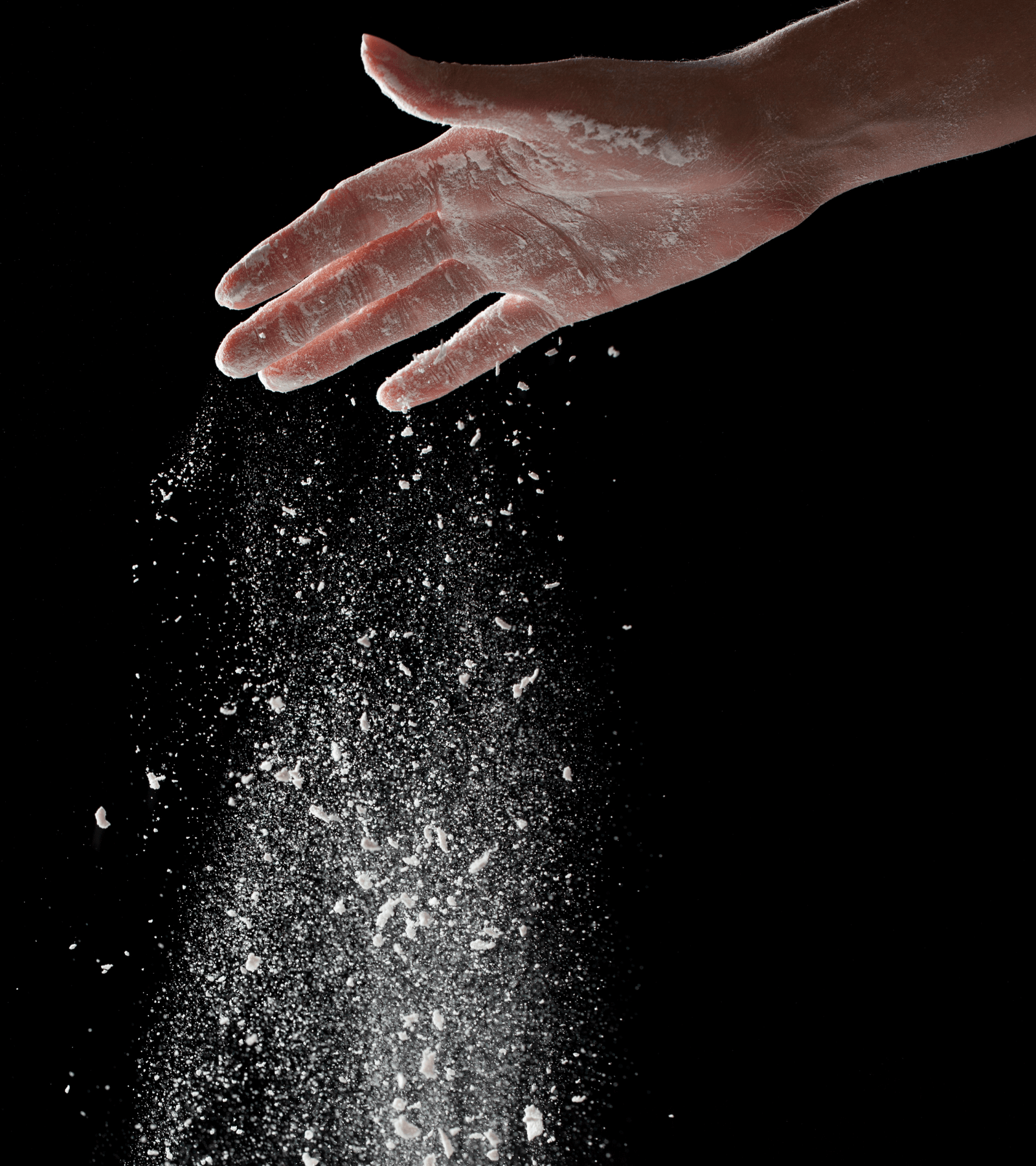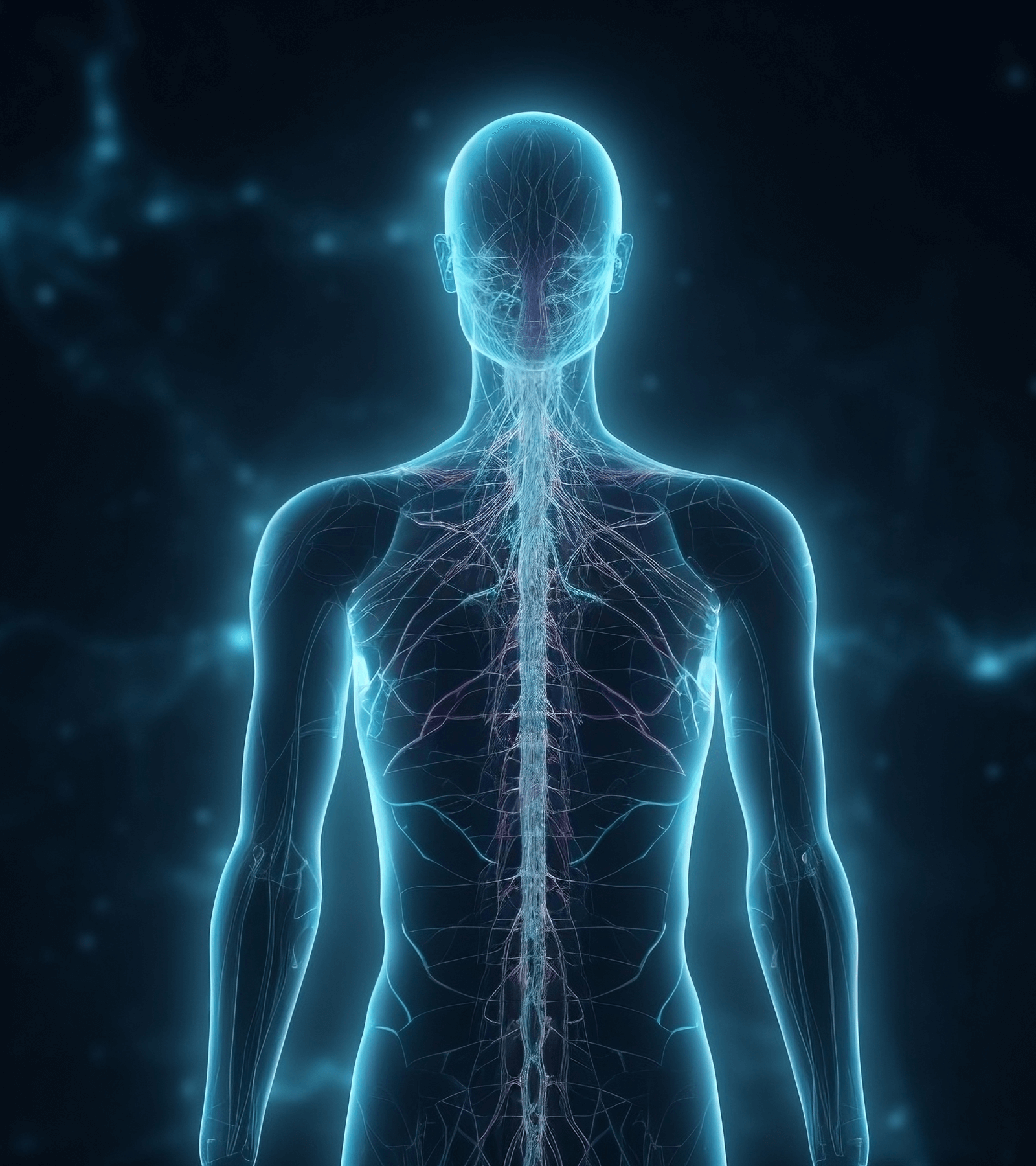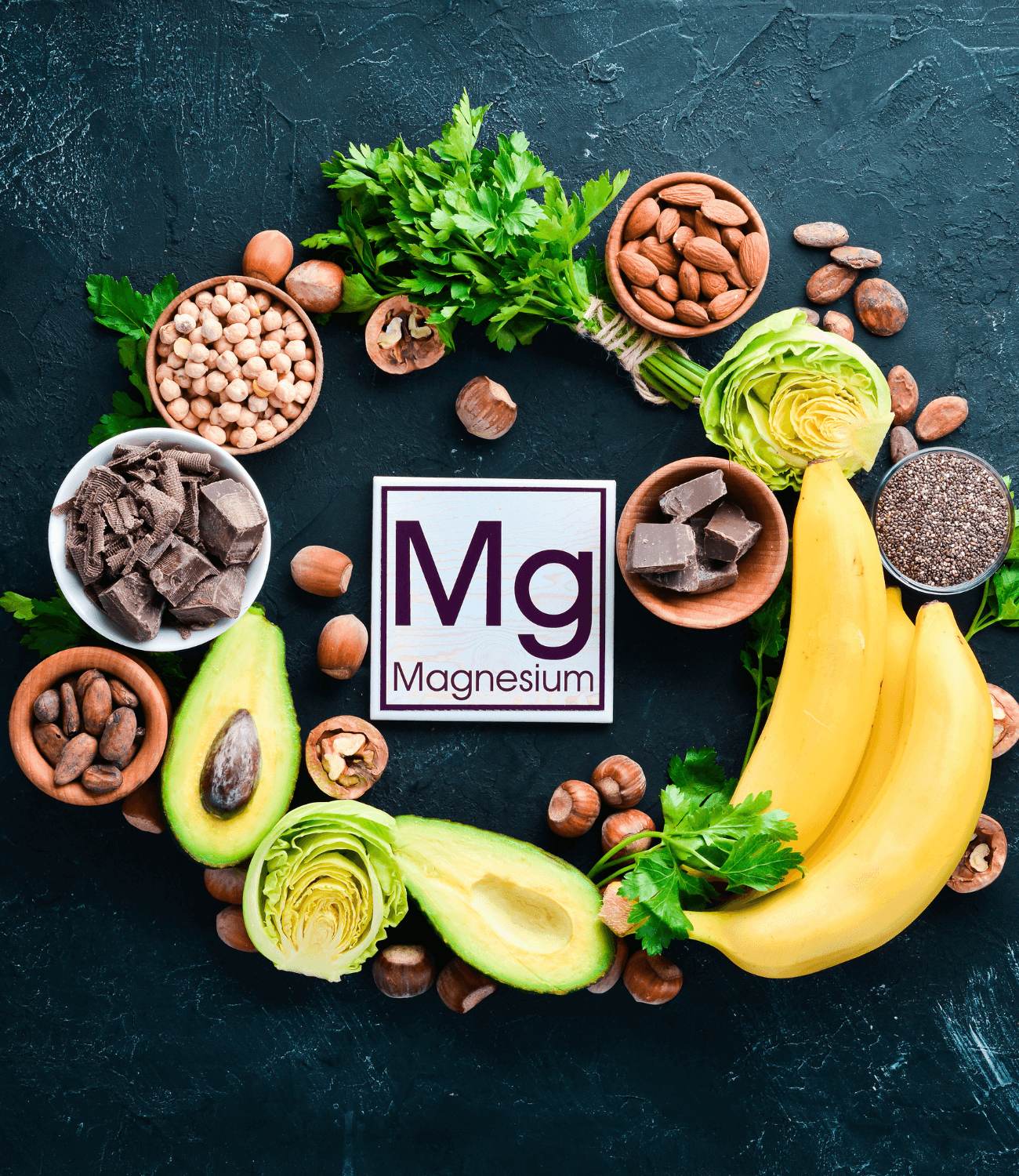
Magnesium is one of the most important minerals for the human body, although it is often overlooked. It plays a crucial role in over 600 enzymatic processes and is thus involved in almost every biological process that affects our daily lives. From energy production to muscle contraction, from DNA synthesis to the regulation of the nervous system - magnesium is the foundation on which our health and performance are built.
Magnesium is one of the most important minerals for the human body, although it is often overlooked. It plays a crucial role in over 600 enzymatic processes and is thus involved in almost every biological process that affects our daily lives. From energy production to muscle contraction, from DNA synthesis to the regulation of the nervous system - magnesium is the foundation on which our health and performance are built.


- Magnesium contributes to normal muscle function by supporting muscle contraction and relaxation.
- Magnesium helps reduce tiredness and fatigue by participating in energy production .
- Magnesium helps maintain electrolyte balance , which is especially important for athletes.
- Magnesium supports the normal functioning of the nervous system , which can contribute to better stress management and relaxation.
- Magnesium contributes to normal psychological function by stabilizing mood and supporting cognitive function.
- Magnesium plays an important role in the maintenance of normal bones and teeth .
- Magnesium contributes to normal protein synthesis , which is essential for the regeneration and building of muscle tissue.
*Health claims approved by EFSA
- Magnesium contributes to normal muscle function by supporting muscle contraction and relaxation.
- Magnesium helps reduce tiredness and fatigue by participating in energy production .
- Magnesium helps maintain electrolyte balance , which is especially important for athletes.
- Magnesium supports the normal functioning of the nervous system , which can contribute to better stress management and relaxation.
- Magnesium contributes to normal psychological function by stabilizing mood and supporting cognitive function.
- Magnesium plays an important role in the maintenance of normal bones and teeth .
- Magnesium contributes to normal protein synthesis , which is essential for the regeneration and building of muscle tissue.
*Health claims approved by EFSA


Magnesium is often referred to as the "anti-stress mineral" because it plays a central role in regulating the nervous system. It helps modulate the activity of the sympathetic nervous system - which is responsible for the "fight or flight" response - so it can help to relax and reduce stress. Especially during hectic times at work or university, where stress levels are often high, magnesium can help to keep a clear head and calm the nerves.Magnesium is also crucial for muscle and nerve function. It regulates muscle contraction and relaxation, which makes it particularly indispensable for athletes and people who are physically active. Through its role in the transmission of nerve impulses, magnesium supports coordination and balance - essential functions that are of great importance both in sport and in everyday life.
Magnesium is often referred to as the "anti-stress mineral" because it plays a central role in regulating the nervous system. It helps modulate the activity of the sympathetic nervous system - which is responsible for the "fight or flight" response - so it can help to relax and reduce stress. Especially during hectic times at work or university, where stress levels are often high, magnesium can help to keep a clear head and calm the nerves.Magnesium is also crucial for muscle and nerve function. It regulates muscle contraction and relaxation, which makes it particularly indispensable for athletes and people who are physically active. Through its role in the transmission of nerve impulses, magnesium supports coordination and balance - essential functions that are of great importance both in sport and in everyday life.


In our modern life, which is often characterized by stress and hectic pace, the body's need for magnesium can increase. Stress causes magnesium to be excreted in the urine, increasing the need for this mineral. A chronic magnesium deficiency can manifest itself in a variety of symptoms, including fatigue, irritability, sleep disorders and muscle cramps. Adequate magnesium levels help to relax the body, improve sleep and promote general well-being.
Magnesium is also a key factor in energy production in cells. It is involved in the conversion of nutrients into energy and thus supports the maintenance of a stable energy level in everyday life. Especially in stressful phases when our body is running at full speed, it is important that there is enough magnesium to ensure energy supply.
In our modern life, which is often characterized by stress and hectic pace, the body's need for magnesium can increase. Stress causes magnesium to be excreted in the urine, increasing the need for this mineral. A chronic magnesium deficiency can manifest itself in a variety of symptoms, including fatigue, irritability, sleep disorders and muscle cramps. Adequate magnesium levels help to relax the body, improve sleep and promote general well-being.
Magnesium is also a key factor in energy production in cells. It is involved in the conversion of nutrients into energy and thus supports the maintenance of a stable energy level in everyday life. Especially in stressful phases when our body is running at full speed, it is important that there is enough magnesium to ensure energy supply.


Magnesium is an essential mineral for athletes. It supports performance on various levels. Firstly, it is essential for muscle function as it is involved in the regulation of muscle contraction. A magnesium deficiency can lead to muscle cramps and reduced performance. Secondly, magnesium plays a role in recovery after training as it promotes muscle relaxation and inhibits inflammatory processes in the body.
Magnesium also helps reduce tiredness and fatigue. Through its involvement in energy production, it helps athletes maintain a high level of performance for longer and recover more quickly from intensive training sessions.
Magnesium is an essential mineral for athletes. It supports performance on various levels. Firstly, it is essential for muscle function as it is involved in the regulation of muscle contraction. A magnesium deficiency can lead to muscle cramps and reduced performance. Secondly, magnesium plays a role in recovery after training as it promotes muscle relaxation and inhibits inflammatory processes in the body.
Magnesium also helps reduce tiredness and fatigue. Through its involvement in energy production, it helps athletes maintain a high level of performance for longer and recover more quickly from intensive training sessions.


Magnesium is indispensable in everyday working life, especially when there is a lot of stress and mental tension. Longer working hours, intensive multitasking or high concentration requirements mean that the body needs more magnesium. A deficiency can lead to symptoms such as mental exhaustion, nervousness or even tension headaches. Studies show that magnesium increases stress resistance, improves concentration and helps to stay focused and productive for longer. Magnesium is particularly essential for people who do a lot of mental work or work in stressful jobs in order to better cope with daily stress and remain productive in the long term.
Magnesium is indispensable in everyday working life, especially when there is a lot of stress and mental tension. Longer working hours, intensive multitasking or high concentration requirements mean that the body needs more magnesium. A deficiency can lead to symptoms such as mental exhaustion, nervousness or even tension headaches. Studies show that magnesium increases stress resistance, improves concentration and helps to stay focused and productive for longer. Magnesium is particularly essential for people who do a lot of mental work or work in stressful jobs in order to better cope with daily stress and remain productive in the long term.


Magnesium is not only a daily companion for more energy and well-being, but also a decisive factor for a long and healthy life. It supports cell renewal, promotes the stability of bones and teeth and has an anti-inflammatory effect. An optimal magnesium level can also reduce the risk of chronic diseases such as cardiovascular problems, diabetes and osteoporosis. In the long term, magnesium helps maintain physical and mental vitality and protects against age-related health problems. By promoting cell metabolism and regeneration, magnesium ensures that the body remains efficient and healthy even in old age - an essential support for an increased quality of life and longevity.
Magnesium is not only a daily companion for more energy and well-being, but also a decisive factor for a long and healthy life. It supports cell renewal, promotes the stability of bones and teeth and has an anti-inflammatory effect. An optimal magnesium level can also reduce the risk of chronic diseases such as cardiovascular problems, diabetes and osteoporosis. In the long term, magnesium helps maintain physical and mental vitality and protects against age-related health problems. By promoting cell metabolism and regeneration, magnesium ensures that the body remains efficient and healthy even in old age - an essential support for an increased quality of life and longevity.

Ready to incorporate magnesium into your daily routine?
Buy your magnesium hereSources:
Literature & Studies on Magnesium
(1) Gröber U, et al, Magnesium in Prevention and Therapy, Nutrients, 2015 Sep 23;7(9):8199-226.
(2) de Baaij JH, et al, Magnesium in man: implications for health and disease, Physiological Reviews, 2015 Jan;95(1):1-46
(3) Rosanoff A, et al, Suboptimal magnesium status in the United States: are the health consequences underestimated? Nutrition Reviews, 2012 Mar;70(3):153-64
(4) Schimatschek HF and Rempis R, Prevalence of hypomagnesemia in an unselected German population of 16,000 individuals, Magnesium Research, 2001 Dec;14(4):283-90
(5) Djurhuus MS, et al, Insulin increases renal magnesium excretion: a possible cause of magnesium depletion in hyperinsulinaemic states, Diabetic Medicine, 1995 Aug;12(8):664-9.
(6) Wang J, et al, Dietary magnesium intake improves insulin resistance among non-diabetic individuals with metabolic syndrome participating in a dietary trial, Nutrients, 2013 Sep 27;5(10):3910-9.
(7) Brilla, L.R., & Haley, T.F. (1992). Effect of magnesium supplementation on strength training in humans. Journal of the American College of Nutrition, 11(3), 326-329.
(8) Dominguez, LJ, Barbagallo, M., Lauretani, F., Bandinelli, S., Bos, A., Corsi, AM, Simonsick, EM, & Ferrucci, L. (2006). Magnesium and muscle performance in older persons: the InCHIANTI study. The American journal of clinical nutrition, 84(2), 419-426. https://doi.org/10.1093/ajcn/84.1.419
(9) Kass, L.S., & Poeira, F. (2015). The effect of acute vs chronic magnesium supplementation on exercise and recovery on resistance exercise, blood pressure and total peripheral resistance on normotensive adults. Journal of the International Society of Sports Nutrition, 12, 19. https://doi.org/10.1186/s12970-015-0081-z
(10) Matias, CN, Santos, DA, Monteiro, CP, Silva, AM, Raposo, M.deF., Martins, F., Sardinha, LB, Bicho, M., & Laires, MJ (2010). Magnesium and strength in elite judo athletes according to intracellular water changes. Magnesium research, 23(3), 138–141. https://doi.org/10.1684/mrh.2010.0217
(11) Magnesium. (nd). DGE. https://www.dge.de/gesunde-ernaehrung/faq/ausgewaehlte-fragen-und- Answeren-zu-magnesium/#c3587
(12) Moslehi, N., Vafa, M., Sarrafzadeh, J., & Rahimi-Foroushani, A. (2013). Does magnesium supplementation improve body composition and muscle strength in middle-aged overweight women? A double-blind, placebo-controlled, randomized clinical trial. Biological trace element research, 153(1-3), 111–118. https://doi.org/10.1007/s12011-013-9672-1
(13), DA, Matias, CN, Monteiro, CP, Silva, AM, Rocha, PM, Minderico, CS, Bettencourt Sardinha, L., & Laires, MJ (2011). Magnesium intake is associated with strength performance in elite basketball, handball and volleyball players. Magnesium research, 24(4), 215–219. https://doi.org/10.1684/mrh.2011.0290
(14) Terblanche, S., Noakes, TD, Dennis, SC, Marais, D., & Eckert, M. (1992). Failure of magnesium supplementation to influence marathon running performance or recovery in magnesium-replete subjects. International journal of sport nutrition, 2(2), 154-164. https://doi.org/10.1123/ijsn.2.2.154
(15) Veronese, N., Berton, L., Carraro, S., Bolzetta, F., De Rui, M., Perissinotto, E., Toffanello, ED, Bano, G., Pizzato, S., Miotto, F., Coin, A., Manzato, E., & Sergi, G. (2014). Effect of oral magnesium supplementation on physical performance in healthy elderly women involved in a weekly exercise program: a randomized controlled trial. The American journal of clinical nutrition, 100(3), 974-981. https://doi.org/10.3945/ajcn.113.080168
(16) Zhang, Y., Xun, P., Wang, R., Mao, L., & He, K. (2017). Can Magnesium Enhance Exercise Performance?. Nutrients, 9(9), 946. https://doi.org/10.3390/nu9090946


